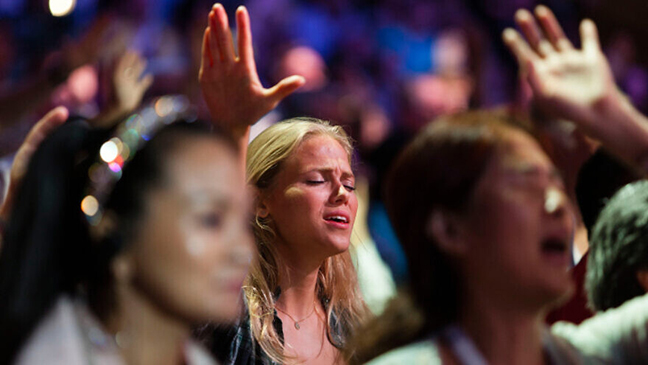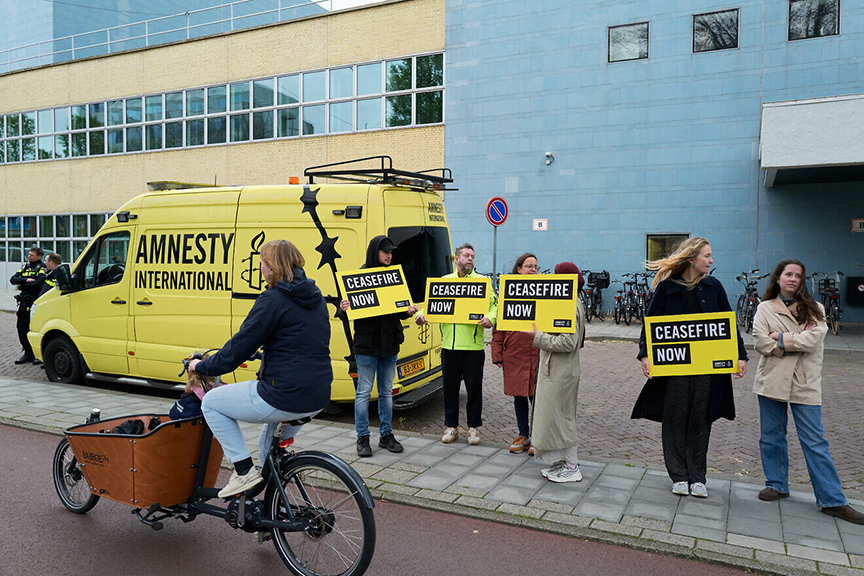A new era for evangelicals and Israel, a bridge to progressives?

Evangelical Christians from around the world sing and recite prayers as they attend the 2013 Jerusalem Chairman’s Conference, hosted by the Israel Allies Foundation, at the International Convention Center in Jerusalem, on Sept. 22, 2013. Photo by Flash90.
by Shlomo Fischer and Dov Maimon
(JNS) — In recent years, the American evangelical community — long considered a bastion of conservative values — has been undergoing a significant shift. The younger generation of evangelicals, millennials and Generation Z is embracing a more progressive outlook, especially on issues like climate change, racial justice and LGBTQ+ rights. Many see this as a potential threat to evangelical support for Israel, which has been historically unwavering and tied to conservative politics.
For decades, evangelical support for Israel has been a cornerstone of the community’s political engagement. Often framed within a biblical narrative of Israel’s Divine restoration, this support has also been deeply intertwined with American conservative ideology. However, as younger evangelicals distance themselves from rigid partisanship, there’s a notable change in how they approach politics and faith. They still value their faith and Israel’s role within it but increasingly view global and domestic issues through the lens of justice, equality and human rights.
Critics might fear that this shift signals a decline in evangelical backing for Israel. But rather than eroding support, this evolution offers a chance to forge new, deeper connections across political divides. While younger evangelicals are more reserved in their support for Israel than their elders, they are more supportive than their non-evangelical peers. Thus, they are not abandoning their faith-based commitment to Israel. Instead, they are reframing it within a broader moral vision — one that resonates with the ideals of justice, dignity and peace, which are central to progressive thought.
This shift among evangelicals presents a unique opportunity to bridge the gap between American Jews, Israel, and the growing black and Latino evangelical populations. Historically underrepresented in discussions about Israel, these communities are increasingly influential within American evangelicalism. They bring with them not only a deep-rooted faith but also lived experiences shaped by systemic racism, immigration struggles and economic inequality.
Israel’s supporters should see this as an opportunity to foster dialogue that aligns Israel’s democratic values with the aspirations of Black and Latino evangelicals for justice and equality. While there is a narrative that promotes black support for the Palestinians as both Palestinians and African Americans are oppressed by “white” oppressors, Black Christian culture also identifies with Israel of the Bible as an enslaved people that has found liberation. This identification is carried forward to modern Israel, which represents the contemporary liberation of the Jews from persecution and genocide. By promoting a narrative that highlights Israel’s diversity, its role as a democracy in a tumultuous region, and its commitment to religious freedom, the pro-Israel community can engage these populations in a way that resonates with their own struggles for fairness and rights.
The parallels are clear: Just as African-Americans and Latino Americans fight for inclusion and representation in the United States, Israel’s diverse population — including its Ethiopian Jews, Arab citizens and LGBTQ+ communities — are engaged in their own efforts for equality. Drawing these connections can foster solidarity, not just political support, between Israel and marginalized groups in the United States who increasingly influence the evangelical movement.
Perhaps the most significant opportunity lies in how this new evangelical stance can foster understanding between Israel and the broader left-leaning sectors of American society. The progressive movement, particularly on college campuses and among younger voters, has become increasingly critical of Israel, largely due to its policies toward Palestinians. While legitimate concerns about the Israeli-Palestinian conflict should be acknowledged and addressed, the narrative that Israel is solely a force for oppression has grown disproportionately dominant on the left.
Here, younger evangelicals — with their commitment to justice and human rights — could serve as a bridge. They are uniquely positioned to advocate for a more nuanced understanding of Israel, one that recognizes its challenges but also celebrates its accomplishments as a pluralistic, democratic society. This isn’t about turning progressives into unconditional supporters of Israel but about fostering a more balanced dialogue that acknowledges Israel’s right to security and its internal diversity while also advocating for peace and Palestinian dignity.
Progressive evangelicals can frame their support for Israel not in opposition to progressive values but as an extension of them. By doing so, they can help build a conversation around Israel that is more constructive, inclusive and forward-looking, one that encourages solutions rather than entrenches division.
The rise of liberal values among younger evangelicals should not be feared by Israel’s supporters. Instead, it represents an opportunity to create new alliances and foster better understanding between Israel and the increasingly diverse and progressive segments of American society, thereby shifting the conversation in the United States around Israel.
At a time when polarization dominates American discourse, these emerging evangelical voices can help create a space for dialogue — one where Israel is neither demonized nor blindly defended but understood in all its complexity. For Israel and those who care about its future, this is not a threat but a bridge to a broader, more inclusive base of support.
In a world where faith and politics are in constant flux, younger evangelicals may just hold the key to a new chapter in U.S.-Israel relations — one that transcends the old divides and builds a future rooted in shared values.
Shlomo Fischer is a sociologist and senior fellow at the Jewish People Policy Institute (JPPI). Dov Maimon is a senior fellow at the Jewish People’s Policy Institute.



